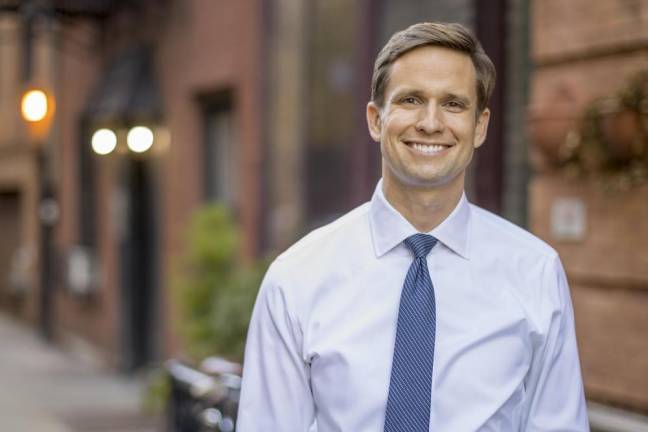Bottcher Pitches Mental Health Plan
City Council candidate’s proposals would tackle the “shadow pandemic” of serious mental illness in NYC

At age 15, District 3 City Council candidate Erik Bottcher was involuntarily admitted to a mental health facility following a number of suicide attempts. It’s treatment he says saved his life, and as a candidate, he’s pitching his plans to make sure every New Yorker has access to crucial mental health care.
“Difficult as the experience was, the 30 days of care that I received at Four Winds Hospital saved my life. It wasn’t until years later that I realized how privileged I was. Most Americans do not have sufficient access to behavioral health care, especially BIPOC people, undocumented people, and those living in poverty,” Bottcher said in a statement.
The city’s mental health care system was decimated over several decades, according to Bottcher. He said in the late 1980s, legislators pushed to privatize mental health care in an attempt to “balance the budget on the backs of the mentally ill.”
His proposals would attempt to fix what has long been broken and tackle what he calls the “shadow pandemic” of serious mental illness in the city. In part, the plan includes stopping the closure of inpatient psychiatric beds, revamping discharge planning and services for formerly incarcerated New Yorkers, increasing school based mental health services, redirecting ThriveNYC funding to address serious mental illness, and more.
“Thousands of our fellow New Yorkers are experiencing unfathomable pain and suffering, right before our eyes,” he said in the statement. “Many of the tragedies that have happened were entirely avoidable with proper care and treatment. I believe it is possible to achieve a society that cares for its most vulnerable and ensures the health and safety of all.”
Here are the key tenets of his proposal:
Stop the Closure of Inpatient Psychiatric Beds: The number of certified inpatient psychiatric beds in New York State dropped 12 percent between 2000 and 2018 while the demand for those beds have ballooned, according to the New York State Nurses Association. Meanwhile, New York City has lost 459 beds. Due to the loss of clinical space, Bottcher said patients have been funneled into the carceral system and the shelter system. To address this, Bottcher is calling on the state to stop decertifying inpatient psychiatric beds, requiring clinical closures to be accompanied by an increase in quality services elsewhere, and to invest money in comprehensive hospital discharge planning.
Immediately Dispatch Mobile Mental Health Crisis Response Teams on the West Side: Bottcher wants the city to accelerate and expand a pilot program that will dispatch health professionals and crisis workers to mental health crises in lieu of police, planned to start in Northern Manhattan, to other neighborhoods, including Chelsea, Hell’s Kitchen and Greenwich Village, which comprise District 3.
“People experiencing mental health emergencies need to be stabilized, treated and connected to appropriate wrap around services,” he said. “For too long, armed police officers have been the default first responders to mental health crises, and this must change.”
Increase Crisis Stabilization Centers
Often, Bottcher said, unhoused New Yorkers experiencing a mental health crisis are deemed not sick enough to stay in a hospital and are discharged back to the streets hours later. For these individuals who are not sick enough to stay in the hospital, but too sick to return to a shelter or the streets, Bottcher said crisis stabilization centers, or medical respite beds, can provide time and space to recuperate. He said there are too few of these centers available in the city, and is calling for the medical respite program to be expanded significantly in all five boroughs.
Build Supportive Housing with Mental Health Services
Permanent supportive housing is key for individuals to be able to lead full lives outside hospital settings, the shelter system or criminal justice system, Bottcher said. He proposes the construction of quality supportive housing in all borough that includes the conversion of distressed commercial properties.
Embrace and Expand the “Clubhouse Model” of Psychosocial Rehabilitation
The Clubhouse Model – which, according to Bottcher, was created decades ago by Hell’s Kitchen’s own Fountain House and is now used internationally – is a community-based service model that helps people with a history of serious mental illness rejoin society and maintain their place in it. A clubhouse functions as a community center where individuals with mental illness can find opportunities for employment, housing, education, friendship and access to medical and psychiatric services. Bottcher proposes that the city immediately begin facilitating the creation of at least 10 more clubhouses across the city, which he said in turn will lower rates of hospitalization, incarceration, and suicide among those with serious mental illness.
Revamp Discharge Planning & Services for Formerly Incarcerated New Yorkers
Bottcher is calling to enact to legislation, sponsored by Assembly Member David Weprin and State Senator Luis Sepulveda, that would require the state to assist people in obtaining housing prior to release from a correctional institution. The bill would also require the state to reimburse local social services districts, including New York City, for each discharge to temporary shelter in that district. The funds, Bottcher said, could then be used to ensure proper supportive services, live behavioral health care.
Increase School-Based Behavioral Health
In the $37.8 billion state legislators have appropriated for public schools in the next budget, Bottcher said a portion should be earmarked for school-based counseling and ensuring schools are staffed with nurses, counselors and social workers who are trained to identify warning signs of behavioral health issues and make referrals to behavioral health professionals.
Redirect ThriveNYC Funds to Address Serious Mental Illness
Bottcher said much of ThriveNYC’s $250 million annual budget has not been used to actually serve those with serious mental illness, and proposes the city divert these funds to other services that have been proven to help New Yorkers who are suffering.
For more election coverage, sign up for The Trail, our weekly newsletter covering Manhattan politics: www.bit.ly/thetrailnyc